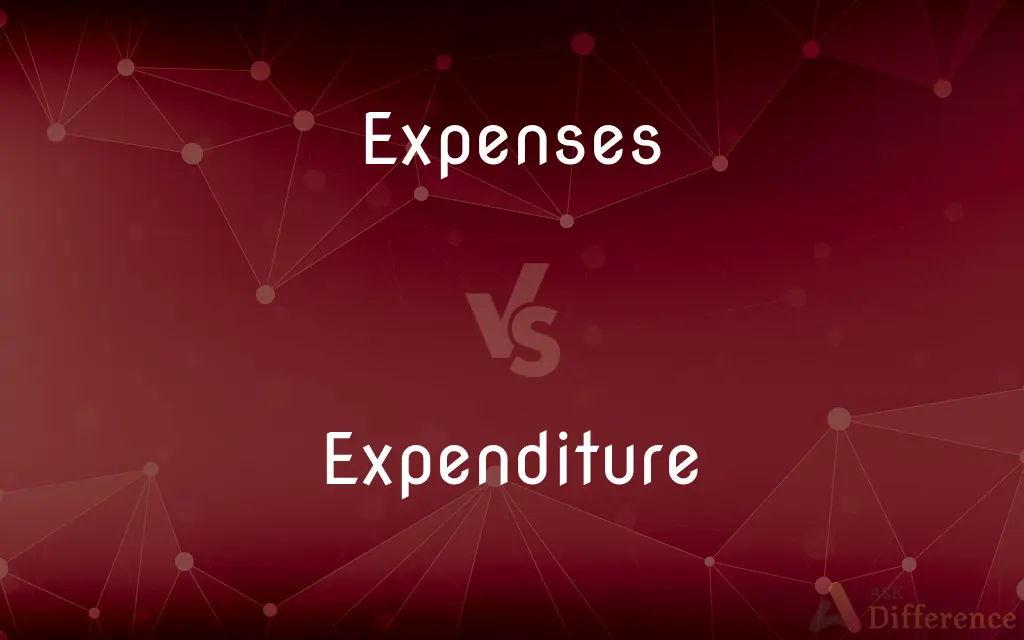Expenses vs. Expenditure — What's the Difference?
Edited by Tayyaba Rehman — By Fiza Rafique — Published on January 2, 2024
Expenses refer to the money spent on daily business operations. Expenditure encompasses both capital outlays and operational expenses. Both involve outflow of money, but for different reasons.

Difference Between Expenses and Expenditure
Table of Contents
ADVERTISEMENT
Key Differences
Expenses are costs that a business incurs through its normal operations, such as salaries, rent, and utilities. These are recurring in nature and are deducted from the company's revenue to determine its net profit. Expenditure, on the other hand, refers to the total amount of money a business spends, including both its capital and operational outlays.
Expenses are usually recognized in the income statement of a company when they are incurred. They directly affect the profit and loss account. Expenditure can be categorized into capital expenditure (CAPEX) and operating expenditure (OPEX). CAPEX refers to the spending on long-term assets like machinery, while OPEX includes daily operational costs.
In accounting terms, expenses are matched with revenues on the income statement. They are tied to specific time periods, such as a month or a year. Expenditure may not immediately affect the company's income statement. It might be spread out over time, especially if it is a capital expenditure which is typically amortized or depreciated over its useful life.
A significant difference between the two is their impact on financial statements. Expenses directly impact the income statement, reducing the net income. Expenditure, especially capital expenditure, impacts the balance sheet as it adds to the asset base and might also affect the income statement over time through depreciation.
Expenses have a more immediate effect on a company's financial position as they are deducted from revenues. Expenditure, especially when related to long-term assets, has a prolonged effect, shaping the company's financial position over multiple periods.
ADVERTISEMENT
Comparison Chart
Nature
Recurring costs of daily operations
Total spending, including capital and operational
Financial Statement
Directly impacts income statement
Affects both income statement & balance sheet
Time Frame
Tied to specific periods (e.g., monthly, yearly)
Can spread over multiple periods
Examples
Salaries, rent, utilities
Buying machinery, daily operations
Impact on Profit
Reduces net income immediately
Might reduce net income over time
Compare with Definitions
Expenses
Outflows of cash for items or services used in generating revenue.
The advertising expenses increased this year, leading to more sales.
Expenditure
Outflows which may or may not be associated with revenue generation.
Research and development is a crucial expenditure for tech companies.
Expenses
The recurring costs incurred by a business in its daily operations.
The monthly expenses for the store include rent, salaries, and electricity.
Expenditure
Money paid out to acquire assets or receive services.
The annual report highlighted the total expenditure incurred by the department.
Expenses
Costs that do not result in the acquisition of long-term assets.
The company's annual report showed a rise in day-to-day expenses.
Expenditure
The act of spending or using funds.
The company's capital expenditure this year focused on expanding its infrastructure.
Expenses
Deductions on the income statement that reduce a company's profit.
After accounting for all expenses, the net profit was considerably lower.
Expenditure
Costs incurred, either as an investment or for operational needs.
The government's public health expenditure increased this fiscal year.
Expenses
Something spent to attain a goal or accomplish a purpose
An expense of time and energy on the project.
Expenditure
The act or process of expending; outlay.
Expenses
A loss for the sake of something gained; a sacrifice
Achieved speed at the expense of accuracy.
Expenditure
An amount expended.
Expenses
An expenditure of money; a cost
An improvement that was well worth the expense.
A trip with all expenses paid.
Expenditure
An expense.
Expenses
Charges incurred by an employee in the performance of work
Was reimbursed for her travel expenses.
Expenditure
Act of expending or paying out.
Expenses
(Informal) Money allotted for payment of such charges.
Expenditure
The amount expended; expense; outlay.
The expenditure of time, money, and political capital on this project has been excessive.
Expenses
Something requiring the expenditure of money
Redecorating the house will be a considerable expense.
Expenditure
The act of expending; a laying out, as of money; disbursement.
Our expenditure purchased commerce and conquest.
Expenses
(Archaic) The act of expending.
Expenditure
That which is expended or paid out; expense.
The receipts and expenditures of this extensive country.
Expenses
To charge with expenses.
Expenditure
Money paid out
Expenses
To write off as an expense.
Expenditure
The act of spending money for goods or services
Expenses
Plural of expense
Expenditure
The act of consuming something
Expenses
Money spent by an individual or organization for specific purposes.
Traveling expenses for the conference were reimbursed by the company.
Expenditure
Amounts spent on both capital and operational activities.
The total expenditure for the project surpassed the initial estimates.
Common Curiosities
How are expenses recognized in financial statements?
Expenses are recognized on the income statement in the period they are incurred.
What's a common example of an expenditure?
Purchasing machinery or equipment for a company is a common example of an expenditure.
Is buying land considered an expense or expenditure?
Buying land is considered a capital expenditure.
Can a capital expenditure become an expense?
Yes, over time through depreciation or amortization, capital expenditure can become an expense.
Are all expenditures expenses?
No, not all expenditures are expenses. Expenditures include both operational costs and capital outlays.
What are expenses in accounting terms?
Expenses are costs incurred by a business during its daily operations that reduce its profit.
How do expenses differ from losses?
Expenses are planned costs of doing business, while losses are unplanned and arise from unforeseen events.
How do companies manage their expenditure?
Companies manage expenditure through budgeting, forecasting, and financial analysis.
Do expenses affect net income?
Yes, expenses directly reduce the net income of a company.
What's the primary difference between expenses and expenditure in business?
Expenses are recurring operational costs, while expenditure encompasses both daily costs and capital outlays.
Can expenditure lead to future benefits for a company?
Yes, especially capital expenditure which often results in future benefits like increased production capacity.
Are salaries an expense or expenditure?
Salaries are considered operational expenses.
Do both expenses and expenditure represent outflows of money?
Yes, both involve outflows of money but for different purposes and durations.
Which is broader, expenses or expenditure?
Expenditure is broader, encompassing all outflows of money, while expenses are a subset focused on operational costs.
Do expenses show up on the balance sheet?
No, expenses are recorded on the income statement. Only their effect on retained earnings appears on the balance sheet.
Share Your Discovery

Previous Comparison
Chelating Agent vs. Sequestering Agent
Next Comparison
Beef Stew vs. Beef BourguignonAuthor Spotlight
Written by
Fiza RafiqueFiza Rafique is a skilled content writer at AskDifference.com, where she meticulously refines and enhances written pieces. Drawing from her vast editorial expertise, Fiza ensures clarity, accuracy, and precision in every article. Passionate about language, she continually seeks to elevate the quality of content for readers worldwide.
Edited by
Tayyaba RehmanTayyaba Rehman is a distinguished writer, currently serving as a primary contributor to askdifference.com. As a researcher in semantics and etymology, Tayyaba's passion for the complexity of languages and their distinctions has found a perfect home on the platform. Tayyaba delves into the intricacies of language, distinguishing between commonly confused words and phrases, thereby providing clarity for readers worldwide.














































